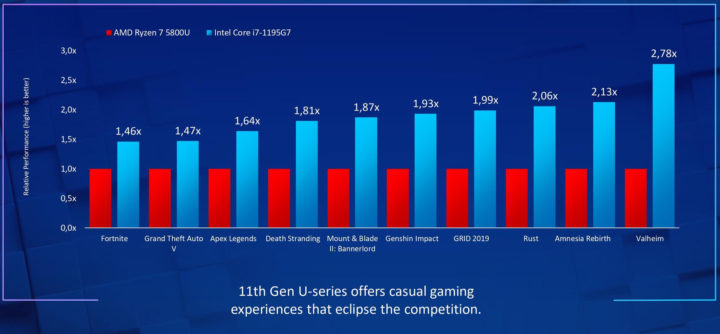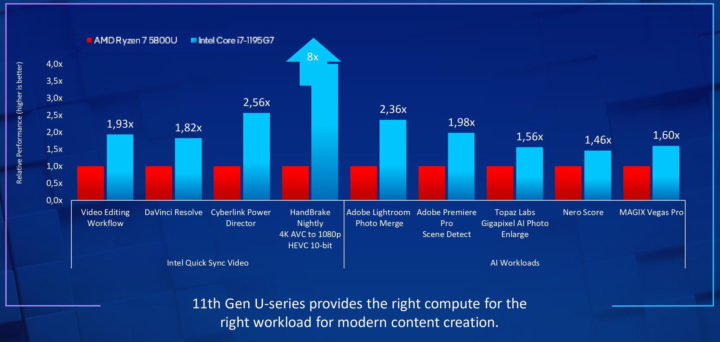Intel introduced the Tiger Lake family of processors last September with the 7-15W UP4-Series SoCs, and the more powerful 12-28W UP3-Series processors.
The company has announced two new Tiger Lake processors at Computex 2021 with the Core i5-1155G7 and Core i7-1195G7 U-Series with the latter reaching up to 5.0 GHz with Intel Turbo Boost on a single core to compete and in some cases outperform AMD Ryzen 5000-series mobile processors.
| Processor | Graphics | Cores / Threads | Graphics (EUs) | Cache | Memory Operating Range | Base Freq (GHz) | Max Single Core Turbo (GHz, up to) | Max All Core Turbo (GHz, up to) | Graphics Max Freq (GHz, up to) |
|---|---|---|---|---|---|---|---|---|---|
| Intel Core i7-1195G7 | Intel Iris Xe | 4/8 | 96 | 12MB | DDR4-3200 or LPDDR4x-4266 | 2.9 | 5.0 | 4.6 | 1.40 |
| Intel Core i7-1185G7 | Intel Iris Xe | 4/8 | 96 | 12MB | DDR4-3200 or LPDDR4x-4266 | 3.0 | 4.8 | 4.3 | 1.35 |
| Intel Core i7-1165G7 | Intel Iris Xe | 4/8 | 96 | 12MB | DDR4-3200 or LPDDR4x-4266 | 2.8 | 4.7 | 4.1 | 1.30 |
| Intel Core i5-1155G7 | Intel Iris Xe | 4/8 | 80 | 8MB | DDR4-3200 or LPDDR4x-4266 | 2.5 | 4.5 | 4.3 | 1.35 |
| Intel Core i5-1145G7 | Intel Iris Xe | 4/8 | 80 | 8MB | DDR4-3200 or LPDDR4x-4266 | 2.6 | 4.4 | 4.0 | 1.3 |
| Intel Core i5-1135G7 | Intel Iris Xe | 4/8 | 80 | 8MB | DDR4-3200 or LPDDR4x-4266 | 2.4 | 4.2 | 3.8 | 1.30 |
| Intel Core i3-1125G4 | Intel UHD Graphics | 4/8 | 48 | 8MB | DDR4-3200 or LPDDR4x-3733 | 2.0 | 3.7 | 3.3 | 1.25 |
| Intel Core i3-1115G4 | Intel UHD Graphics | 2/4 | 48 | 6MB | DDR4-3200 or LPDDR4x-3733 | 3.0 | 4.1 | 4.1 | 1.25 |
While reaching 5GHz on a 28W processor is a nice milestone, nothing much has changed as we can see from the table above, except for tweaks in the CPU and GPU frequency. The base frequency has actually been slightly lowered in the new part, but the Turbo frequencies for single-core and all cores have been increased.
Intel did share some performance slides comparing a Core i7-1195G7 system to one with AMD Ryzen 7 5800U.
The first slide shows casual gaming is much faster/smoother on the Intel platform for the selected games.
The second shows how content creation can be made much faster when using Intel Quick Sync Video (QSV) for video editing/transcoding & Intel Gaussian and Neural Accelerator 2.0 for AI workloads.
As usual, one must be extra careful when using benchmarks provided by the marketing team, and Intel shared the configuration details for each benchmark. Let’s take the HandBrake benchmark since it’s the most “dramatic” with an 8x performance improvement:
As measured by HandBrake Workload Processor: Intel Core i7-1195G7 processor at PL1= 28W, 4C8T, Memory: LPDDR4-4267MHz, 2x8GB, dual channel and dual rank, Storage: Samsung PM9A1 SSD, Display Resolution: 1920x1080p, OS: Microsoft Windows 10 20H2-19042.844. Power policy set to AC/Balanced mode for all benchmarks except SYSmark 25 which is measured in AC/BAPCo mode for Performance. All benchmarks run in Admin mode. Graphics: Intel® Xe Graphics, Graphics driver: prod-hi-releases_2021-01-26-ci-master- 7075-revenue-pr-1009268-TGL, Bios version: ucode 16 measured on Intel reference board. Processor: AMD Ryzen 7 5800U processor, 8C16T, Memory: 2x8GB DDR4-3200MHz, Storage: Samsung 512GB MZVLQ512HALU-000H1, Display Resolution: 1920x1080p, OS: Microsoft Windows* 10 20H2-19042.844. Power policy set to AC/Balanced mode for all benchmarks except SYSmark 25 which is measured in AC/BAPCo mode for Performance. All benchmarks run in Admin mode. Graphics: AMD Radeon(TM) Graphics, Graphics driver: 27.20.21002.112, Bios version: 01.02 measured on HP Probook 455 G8 laptop. Testing done using the system’s out-of-box performance profile, with Windows EPP slider set to “better performance”. Observed 15W sustained power level with bursts at ~25W from AMD’s μProf tool Testing as of May 21, 2021
That benchmark was done on an Intel reference board, while the AMD test was performed on a consumer laptop. Usually, not a big problem as long as cooling is done properly on the laptop. Intel QSV is supported in Handbrake, and so is AMD VCE (Video Codec Encoder), and both need to be enabled in the settings, and Intel did not mention any of that, so it’s impossible to make a conclusion here.
Gaming benchmarks were done on an Intel Core i7-1195G7 MSI Prestige 14 pre-production laptop with Intel Dynamic Tuning Technology (Intel DTT) enabled at 35W, or Intel’s reference board, against the same HP Probook 455 G8 laptop used with Handbrake.
Intel says more than 60 designs based on the Intel Core i7-1195G7 and Intel Core i5-1155G7 are expected by the end of the year with laptops from Acer, ASUS, Lenovo, and MSI available this summer. More details about the Core i7-1195G7 processor can be found on Intel Ark, but features will just be the same as other Tiger Lake UP3 mobile processors.

Jean-Luc started CNX Software in 2010 as a part-time endeavor, before quitting his job as a software engineering manager, and starting to write daily news, and reviews full time later in 2011.
Support CNX Software! Donate via cryptocurrencies, become a Patron on Patreon, or purchase goods on Amazon or Aliexpress. We also use affiliate links in articles to earn commissions if you make a purchase after clicking on those links.






Old Intel Apples to Apples, Intel has faster memory and faster SSD Generation?
A fiction scene..
— Woman: Whose is this pile of processors ?
— Man: It’s Inty’s baby.
— Woman: Who is Inty?
— M: Inty is dead baby. Timmy has shot him down in the head with one silver bullet.
Wroooommmmmm